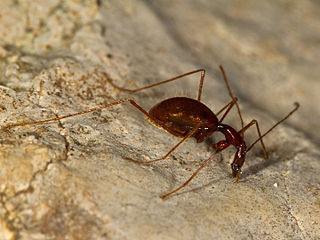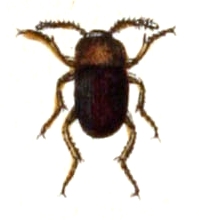
Cholevinae is a subfamily of small carrion beetles in the family Leiodidae. There are more than 260 genera and 1,100 described species in Cholevinae.

Anemadini is a tribe of small carrion beetles in the family Leiodidae. There are at least 30 genera and more than 70 described species in Anemadini.
Sogdini is a tribe of round fungus beetles in the family Leiodidae. There are about 7 genera and at least 20 described species in Sogdini.
Hydnobius is a genus of round fungus beetles in the family Leiodidae. There are about seven described species in Hydnobius.
Podolasiini is a tribe of May beetles and junebugs in the family Scarabaeidae. There are at least 2 genera and about 18 described species in Podolasiini.
Pinodytes newtoni is a species of eyeless soil fungivore beetle in the family Leiodidae. It is found in North America.
Pinodytes rothi is a species of eyeless soil fungivore beetle in the family Leiodidae. It is found in North America.
Ptomaphagus appalachianus is a species of small carrion beetle in the family Leiodidae. It is found in North America.
Kalohydnobius dentatus is a species of round fungus beetle in the family Leiodidae. It is found in North America.
Hydnobius kiseri is a species of round fungus beetle in the family Leiodidae. It is found in North America.
Macrohydnobius simulator is a species of round fungus beetle in the family Leiodidae. It is found in North America.
Pinodytes gibbosus is a species of eyeless soil fungivore beetle in the family Leiodidae. It is found in California, inhabiting leaf litter.

Triarthron lecontei is a species of round fungus beetle in the family Leiodidae. It is found in North America.

Xyletinini is a tribe of death-watch and spider beetles in the family Ptinidae. There are at least 10 genera and 70 described species in Xyletinini.

Hadrobregmini is a tribe of death-watch beetles in the family Ptinidae. There are at least 3 genera and about 16 described species in Hadrobregmini.

Euceratocerini is a tribe of death-watch beetles in the family Ptinidae. There are at least 4 genera and about 18 described species in Euceratocerini.

Cholevini is a tribe of small carrion beetles in the family Leiodidae. There are more than 20 genera and 200 described species in Cholevini.

Leptodirini is a tribe of small carrion beetles in the family Leiodidae. There are more than 190 genera and 750 described species in Leptodirini.
Oritocatopini is a tribe of small carrion beetles in the family Leiodidae.

Ptomaphagini is a tribe of small carrion beetles in the family Leiodidae. There are about 14 genera and more than 110 described species in Ptomaphagini.







